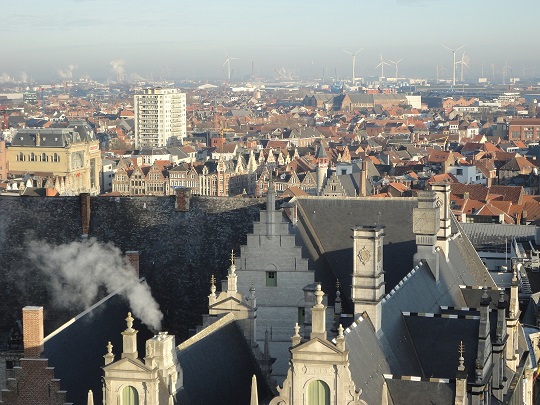This sceptred isle, this other Eden, this England and all that. I like to imagine this speech from Richard II spoken in a Flemish accent, given it is delivered by John of Gaunt – or as we now call it, Ghent.
Ghent is a great place to spend a few days, something like a combination of Oxford and Newcastle with an ancient, well-preserved city centre, a major port and lots of students. But going round its excellent museums you get a sense of departed glory. STAM, the city history museum, uses graphics to show how Ghent’s population was comparable to Paris and Brussels in the 16th century. But Ghent is now a city of just quarter of a million people.

A special exhibition at the Caermers Convent, Voor God en Geld (the organisers gave it the English title ‘The birth of capitalism’, although ‘For God and money’ is a closer translation), provides reasons why. Using rooms of objects and paintings, it shows the Southern Netherlands as the economic centre of the world from the 13th to the 16th century, a place where ambitious people moved to cities, became entrepreneurs and travelled the world to trade.
“This is where capitalism was invented,” writes Fernand Huts, the chief executive of logistics group Katoen Natie, whose Phoebus Foundation helped organise the exhibition. “Our region was the Silicon Valley of the Middle Ages.” Some of this wealth was spun out of English wool: the exhibition includes a 1489 trade treaty between England and the Burgundian Netherlands covering this. Both sides benefitted: the grand churches funded by that wool trade still grace Norfolk and the Cotswolds.
So what happened? In 1581, the northern Netherlands declared independence from the Habsburg empire, and the south tried to follow. The empire fought to retain control, capturing Brussels and Ghent and laying siege to Antwerp, which fell in 1585. The entrepreneurs moved north to Amsterdam, triggering its golden age. (Like Ghent, Amsterdam goes on about its glory days in its museums.) To cut a long story short, Ghent is now a pleasant mid-sized Belgian city rather than one of the capitals of the world.
London remains one of those capitals of the world, attracting entrepreneurs from all over. (Fernand Huts bases himself in Kent, not Ghent.) The UK capital rose to become a great commercial centre in the late 16th century just as Ghent was declining.
Ghent shows is that such a status is not God-given for eternity; a city has to be open for business and the world to keep its global status. A British government negotiating its exit from the huge trading area that includes Ghent will hopefully bear that in mind.
